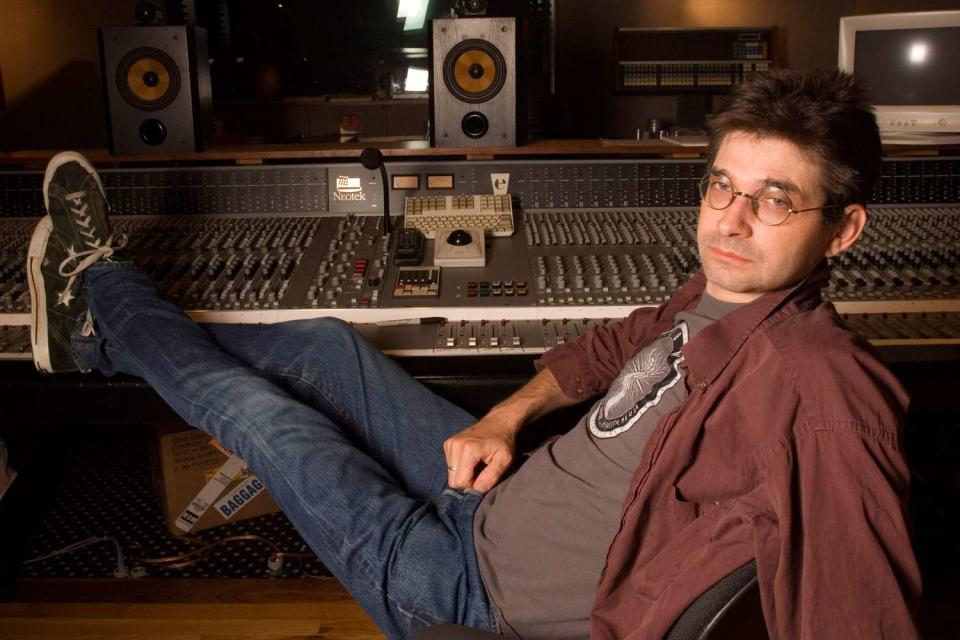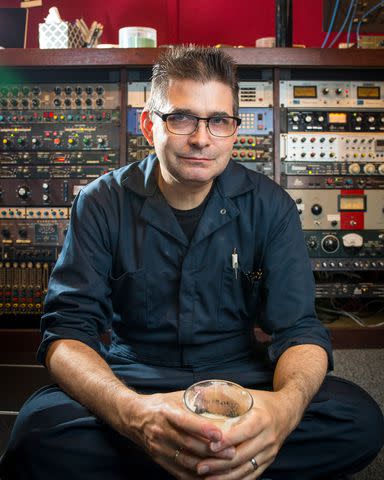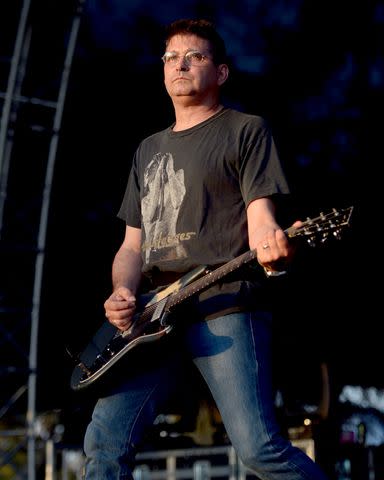Steve Albini, Indie Rock Icon and Shellac, Big Black Frontman, Dead of Heart Attack at 61
The legendary engineer and musician recorded classic albums like Nirvana’s 'In Utero,' Pixies’ 'Surfer Rosa,' and PJ Harvey's 'Rid of Me'

Paul Natkin/Getty
American musician and producer Steve Albini in the 'A' control room of his studio, Electrical Audio, in Chicago in June 2005Steve Albini, the influential underground rock figure best known for fronting bands like Shellac and Big Black, died on Tuesday, May 7, at the age of 61. The recording studio legend engineered classic albums like Nirvana’s In Utero and Pixies’ Surfer Rosa and operated the Chicago studio Electrical Audio until his final years. The vocalist and guitarist was also an outspoken critic of musicians and others who participated in exploitative industry practices.
Staff members at Albini’s studio, which he founded in 1997, confirmed to multiple outlets that a heart attack caused the revered rock musician’s death. He’s survived by his wife, filmmaker Heather Whinna.

Marc Broussely/Redferns
Steve Albini in London in November 2004Albini, who preferred the title “recording engineer” over “producer,” was born in 1962 in Pasadena, California, and later raised in Missoula, Montana. As a teen, he played in local punk bands before moving to Chicago in the late ‘70s to attend Northwestern University. He graduated with a journalism degree and went on to write about Chicago’s emerging punk scene, where he’d become a fixture for pushing the boundaries of post-punk and alternative rock.
He rose to fame in the early ‘80s as the frontman for the Chicago-based trio he created, Big Black, which released a string of EPs that displayed the punk band’s seething signature guitar sound. The band, comprised of guitarist Santiago Durango and bassist Jeff Pezzati, released their debut album, Atomizer, in 1986, followed by their second project, Songs About F---ing, a year later, which marked their break up.
“The more time passes, the more correct I think that assessment was,” Albini told The Guardian in 2023. “The band had persisted in making this hideous music and proven that if you have a valid set of working principles, you can do it on your own terms and never have to kiss anybody’s ass.”

Brian Cassella/Chicago Tribune/Tribune News Service via Getty
Steve Albini in his studio in Chicago in July 2014Following Big Black’s split, Albini went on to form the noise rock band Rapeman. The band released only one album in 1988, Two Nuns and a Pack Mule, before also breaking up. Albini’s musical efforts then turned toward the studio, where he lent his production to other artists’ music, such as Robert Plant, The Stooges, Cheap Trick, Chevelle, and Superchunk.
By the early ‘90s, Albini continued to produce and engineer albums for various artists, widening his acclaim as he formed the band Shellac with drummer Todd Trainer and bassist Bob Weston in 1992. The trio released five albums during their years-long run, with their last, titled To All Trains, set to drop on May 17. The album, which they originally planned to tour, marks their first studio album release since 2014’s Dude Incredible.

Matt Winkelmeyer/Getty
Steve Albini performing with Shellac in Los Angeles in August 2016By his count, Albini worked on over 2,000 albums for mainstream acts and other artists over the course of his lifetime. "If you pace yourself, you don’t really have to worry about [burning out]," he told Rolling Stone in 2014.
"I tend not to work at excruciating volume, so my ears are not physically fatigued," he continued. "My attention span could still be fatigued, but there are tricks to preserve that ... You have to focus your attention on the minute details now and again, but if you spend every second of the session gritting your teeth and staring at the speakers and concentrating intently on every single thing that happens, then you eventually burn out your attention span, and then you can’t do any work whatsoever."
For more People news, make sure to sign up for our newsletter!
Read the original article on People.


